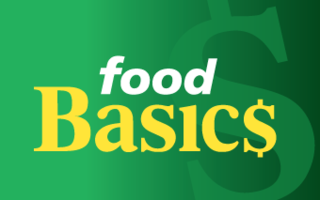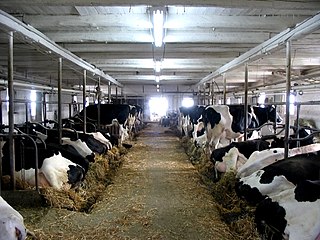Related Research Articles

Free-range eggs are eggs produced from birds that may be permitted outdoors. The term "free-range" may be used differently depending on the country and the relevant laws, and is not regulated in many areas.

Free range denotes a method of farming husbandry where the animals, for at least part of the day, can roam freely outdoors, rather than being confined in an enclosure for 24 hours each day. On many farms, the outdoors ranging area is fenced, thereby technically making this an enclosure, however, free range systems usually offer the opportunity for the extensive locomotion and sunlight that is otherwise prevented by indoor housing systems. Free range may apply to meat, eggs or dairy farming.

Food Basics Ltd. is a Canadian supermarket chain owned by Metro Inc. The company operates 142 stores throughout Ontario.

Reference Re Agricultural Products Marketing, [1978] 2 S.C.R. 1198 is a landmark constitutional decision of the Supreme Court of Canada on cooperative federalism where the Court unanimously upheld the validity of various Acts passed by the Parliament of Canada and the Legislative Assembly of Ontario for establishing a national agricultural marketing scheme agreed upon by the federal and provincial governments.

Canada is one of the largest agricultural producers and exporters in the world. As with other developed nations, the proportion of the population agriculture employed and agricultural GDP as a percentage of the national GDP fell dramatically over the 20th century, but it remains an important element of the Canadian economy. A wide range of agriculture is practised in Canada, from sprawling wheat fields of the prairies to summer produce of the Okanagan valley. In the federal government, overview of Canadian agriculture is the responsibility of the Department of Agriculture and Agri-Food.

Battery cages are a housing system used for various animal production methods, but primarily for egg-laying hens. The name arises from the arrangement of rows and columns of identical cages connected, in a unit, as in an artillery battery. Although the term is usually applied to poultry farming, similar cage systems are used for other animals. Battery cages have generated controversy between advocates for animal welfare and industrial producers.

Organic egg production is the production of eggs through organic means. In this process, the poultry are fed organic feed. According to the United States Department of Agriculture, organic means that the laying hens must have access to the outdoors and cannot be raised in cages. Only natural molting can occur within the flock; forced molting is not allowed. Organic certification also requires maintenance of basic animal welfare standards.

Poultry farming is the form of animal husbandry which raises domesticated birds such as chickens, ducks, turkeys and geese to produce meat or eggs for food. Poultry – mostly chickens – are farmed in great numbers. More than 60 billion chickens are killed for consumption annually. Chickens raised for eggs are known as layers, while chickens raised for meat are called broilers.

Proposition 2 was a California ballot proposition in that state's general election on November 4, 2008. It passed with 63% of the votes in favor and 37% against. Submitted to the Secretary of State as the Prevention of Farm Animal Cruelty Act, the initiative's name was amended to officially be known as the Standards for Confining Farm Animals initiative. The official title of the statute enacted by the proposition is the Prevention of Farm Animal Cruelty Act.

Mercy For Animals (MFA) is an international nonprofit animal protection organization founded in 1999 by Milo Runkle. MFA's mission is to "prevent cruelty to farmed animals and promote compassionate food choices and policies."

Dairy farming is one of the largest agricultural sectors in Canada. Dairy has a significant presence in all of the provinces and is one of the top two agricultural commodities in seven out of ten provinces.
Dairy Farmers of Ontario (DFO), is the marketing organization and regulatory body representing over 4,000 dairy farmers in Ontario, Canada. DFO was formerly known as the Ontario Milk Marketing Board (OMMB), which was established as result of the 1965 Ontario Milk Act. On August 1, 1995, the Ontario Milk Marketing Board and the Ontario Cream Producers' Marketing Board merged to form Dairy Farmers of Ontario.

Directive 1999/74/EC is legislation passed by the European Union on the minimum standards for keeping egg laying hens which effectively bans conventional battery cages. The directive, passed in 1999, banned conventional battery cages in the EU from 1 January 2012 after a 13-year phase-out. Battery cages were already banned in Germany, Austria, the Netherlands and Sweden prior to 2012. The directive does not apply to establishments with fewer than 350 laying hens or establishments rearing breeding laying hens. Such establishments are, however, subject to the requirements of Directive 98/58/EC. The directive is not supported with fines, penalties or export bans.

Canada's supply management, abbreviated SM, is a national agricultural policy framework used across the country, which controls the supply of dairy, poultry and eggs through production and import controls and pricing mechanisms. The supply management system was authorized by the 1972 Farm Products Agencies Act, which established the two national agencies that oversee the system. The Agriculture and Agri-Food Canada federal department is responsible for both the Canadian Dairy Commission and its analogue for eggs, chicken and turkey products, the Farm Products Council of Canada. Five national supply management organizations, the SM-5 Organizations — Egg Farmers of Canada (EFC), Turkey Farmers of Canada (TFC), Chicken Farmers of Canada (CFC), the Canadian Hatching Egg Producers (CHEP) and the Ottawa-based Canadian Dairy Commission (CDC), a Crown corporation — in collaboration with provincial and national governing agencies, organizations and committees, administer the supply management system.

The broiler industry is the process by which broiler chickens are reared and prepared for meat consumption. Worldwide, in 2005 production was 71,851,000 tonnes. From 1985 to 2005, the broiler industry grew by 158%.
Animal welfare and rights in Canada is about the laws concerning and treatment of nonhuman animals in Canada. Canada has been considered to have weak animal welfare protections by the organization World Animal Protection. The vast majority of Canadians are for further animal protections, according to a poll conducted on behalf of Mercy for Animals.

An Act to Prevent Cruelty to Farm Animals, more commonly known as Question 3, was the third initiative on the 2016 Massachusetts ballot. The measure requires Massachusetts farmers to give chickens, pigs, and calves enough room to turn around, stand up, lie down, and fully extend their limbs. It also prohibits the sale of eggs or meat from animals raised in conditions that did not meet these standards.
Animal welfare and rights in Denmark relates to the treatment of and laws concerning non-human animals in Denmark. Denmark has moderately strong protections for animals by international standards. In 2014 and again in 2020, Denmark received a B grade on the A–G scale of the World Animal Protection's Animal Protection Index.

Proposition 12 was a California ballot proposition in that state's general election on November 6, 2018. The measure was self-titled the Prevention of Cruelty to Farm Animals Act. The measure passed, by a vote of about 63% Yes to 37% No.
References
- ↑ Kuitenbrouwer, Peter (18 January 2016). "Burnbrae Farms egg heiress brushes off 'perception' of conflict as new chief of staff to agriculture minister". Financial Post . Retrieved 16 March 2018.
The family owns at least 470,000 units of egg quota, which, at the current value of $300 a hen, means that her family owns about $140 million of egg quota.
- ↑ Bonokoski, Mark (23 January 2016). "Too many eggs in one political basket". torontosun.com. Toronto Sun . Retrieved 16 March 2018.
In negotiating the TPP, the Harper government anted up $4.3 billion to egg, milk and poultry producers and processors over 10 years to assist in the reduction of the current system of supply-management protection and quotas.
- ↑ Johnson, Kelsey (4 January 2016). "MacAulay picks egg dynasty's Mary Jean McFall as chief of staff". ipolitics.ca. iPOLITICS. Retrieved 16 March 2018.
Agriculture Minister Lawrence MacAulay finally has a chief of staff.
- ↑ "Burnbrae Farms wins top agriculture award for solar egg farm". woodstocksentinelreview. Retrieved 18 August 2021.
- ↑ Farms, Burnbrae. "Burnbrae Farms donates more than 3.6 million eggs to Canadian food banks". www.newswire.ca. Retrieved 18 August 2021.
- ↑ "McDonald's supplier drops 2 egg farms accused of cruelty". 23 October 2013. Retrieved 26 October 2013.
- ↑ https://finance.yahoo.com/news/burnbrae-farms-exposed-mercy-animals-110000136.html
- ↑ https://www.ciwf.org.uk/news/2018/03/noble-foods-commits-to-100-cage-free-eggs-by-2025
- ↑ https://www.poultryworld.net/health-nutrition/mantiqueira-committed-to-free-25-million-layers-until-2025/
- ↑ http://BurnbraeHarms.ca
- ↑ https://www.recorder.ca/news/burnbrae-animal-welfare-group-in-cage-fight